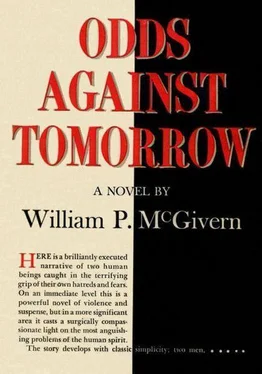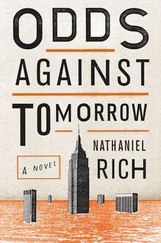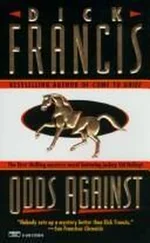“Well, where did you fit in?” Ingram said, puzzled.
“It’s plain enough for Christ’s sake. I could have saved up a few hundred dollars, say, and just plunked it on the table some afternoon. ‘Cut me in for that much,’ I’d have said. And they’d have done it.”
“Why?”
“They liked me, I tell you.”
Ingram shook his head. “You got some funny ideas about the business world. You think smart guys go around saying, ‘Let’s cut this youngster in for a piece, and let’s give a chunk to the happy kid behind the bar.’ It just doesn’t work that way.”
Ingram’s skepticism angered Earl. “What’s so funny about them guys liking me?”
“I didn’t mean to joke about it,” Ingram said. “But look: just being around money doesn’t mean anything. Rich folks aren’t giving anything away — anymore than a twenty-year-old kid is going to give some bald old man his nice curly hair.” Ingram leaned forward earnestly. “Look here. Somebody wins a thousand dollars on a number. So all his friends get excited, acting like they won something, too. They get a big kick out of just being close to luck. Then the man gives the money to his wife or pays some debts, and it’s all over — the money’s gone and the people who crowded around it feel they’ve been cheated out of something. That’s what I mean — if you feel lucky-rich because you’re around some money, you’re in for a headache.”
“But you didn’t know these guys,” Earl said stubbornly.
“Well, maybe they were different. Maybe they’d have cut you in.”
“Sure, they would,” Earl said.
But he realized suddenly and bitterly that the Corley brothers would have smiled and shaken their heads at him.
“It’s what you do yourself that counts,” Ingram said. “You plan something and you go ahead and do it. That makes you feel good. You can think about it later and get a kick out of it.”
“Maybe you’re right,” Earl said tiredly. “I used to think that in the Army. We were doing something we could remember later. But who in hell remembers?”
“You do,” Ingram said.
“It isn’t enough for one guy to remember it,” Earl said. He wasn’t sure of what he meant, but he felt he was getting at something important. “If a lot of guys do a thing together, and only one of them remembers it — well, there’s something wrong with that.”
“It didn’t mean the same to everybody, that’s all.”
“That could be it.” Earl nodded slowly, absorbing Ingram’s explanation. “Maybe you’re right.” He lighted a cigarette and flipped the match into the fireplace. “We’re going to have something to remember, Sambo. If we get out of this in one piece, we’re not going to forget it.”
“Not if we have beards all the way to our knees.”
“What did you use to do in your spare time, Sambo? I mean, did you go to ball games or what?”
“I never was much interested in baseball. I slept days and worked nights. Maybe that’s why.”
“Have you ever been to a ball game?”
“Oh sure.”
“And you didn’t like it?” Earl shook his head, exasperated for some reason. “You didn’t see anything pretty in a pickoff play? Or a long throw coming into the plate to cut off a run?”
“Sure, that’s all interesting.” Sambo’s tone was politely enthusiastic; he didn’t really know or like baseball.
“Interesting!” Earl said. “That’s like saying Marilyn Monroe is a girl!” He couldn’t understand his irritation and disappointment. “You come with me to a ball game, and I’ll show you what to look for.”
“Fine,” Ingram said. “But let’s get out of here first.”
Earl poured himself a little more whisky. Why was he thinking of taking Ingram to a ball game? He couldn’t take him to a restaurant or a bar, that was for sure. But they could sit together and talk at a ball game. Lots of colored people went to the ball parks. They would get bleacher tickets and sit in the sun and drink beer. And they could talk about this thing. What they’d done together was stupid and wrong, okay. But you couldn’t always pick your memories. If you never did anything good or smart, what in Christ’s name were you supposed to think about? You had the right to remember the wrong and stupid things if that’s all you’d ever known. Maybe they were important, anyway. He and Ingram had done something together and they had the right to keep it alive.
“We’ll go to a ball game,” he said, nodding at him. “Don’t forget it.”
“After we get out of here, okay.”
“Don’t worry about that. I got a hunch our luck is changing.” Earl smiled and took a pull on his drink. “That’s your influence. You know what they say about colored folks. Changing luck, I mean.”
“Yeah, I know,” Ingram said slowly.
“It’s just an expression. I didn’t mean anything.”
“That’s all right.” Ingram shrugged and smiled; Earl’s apology made him hot and cold all over, grateful but uneasy at the same time. “Do you feel up to eating? I put some soup on while you were asleep. That’s my real hobby. Cooking.”
“No kidding?”
“It’s a fact. I was the oldest boy, so I ran the house while my mother worked out. I got pretty good at it.”
“Where was the old man?”
“He took off when we were kids. There wasn’t any work. I guess it was all he could do.”
“He could of stuck around,” Earl said. “But it’s six of one, half a dozen of the other. My old man stuck around, and I wished to God he hadn’t.”
“Well, things turned out okay for us. We kept out of trouble. And after my brothers were married I set the old lady up in a nice apartment. I used to come over weekends and cook for her.” Ingram stood up and rubbed his chest with the palms of his hands. “This is the coldest place I’ve ever been in.”
“You ought to take some whisky, I’m telling you.”
“It just doesn’t set right with me. I’ll get your soup. It’s canned, but it smells good. Chicken and rice. You like that?”
“Sounds fine.”
When Ingram left, Earl settled himself cautiously back on the couch and lighted another cigarette. Dawn was pressing against the windows, but the trees bordering the fence line were almost lost in the heavy rolling mists. The ground was black and wet, and he could hear a lonely wind sweeping over the fields and veering away from the old stone walls of the house. Lorraine was still sleeping quietly. Earl felt the warmth of the whisky dulling the pain in his shoulder and lighting all of his thoughts with a glow of hope. They would have to leave in a few hours, of course, trusting themselves to the coldness and the night, and to the lonely, hostile roads. But now they were safe; the fog and rain were like friends hiding them from the police. Ingram was right; tonight they’d have a good chance. He felt a curious, tentative respect for Ingram. The man was smart, no doubt of that. He had been right about the Corley brothers. But Earl didn’t mind being wrong. What difference did it make?
Ingram returned in a few minutes with a bowl of soup, and placed it on the table beside the sofa. “You get this inside you and you’ll feel a lot better.”
“You better try some yourself,” Earl said.
“I don’t feel hungry yet. I’m going upstairs and keep an eye on the road. If anybody comes poking around back here we want to know about it.”
“You better take my overcoat. You’ll freeze.”
“All right, thanks.”
Earl patted the portable radio. “I’ll check the news. Maybe Russia declared war or something, and they’ve forgotten all about us.”
“Well, our draft boards would be after us then,” Ingram said. “We just can’t win for losing, man.”
Читать дальше

![Уильям Макгиверн - Завтра опять неизвестность [английский и русский параллельные тексты]](/books/35168/uilyam-makgivern-zavtra-opyat-neizvestnost-angli-thumb.webp)









